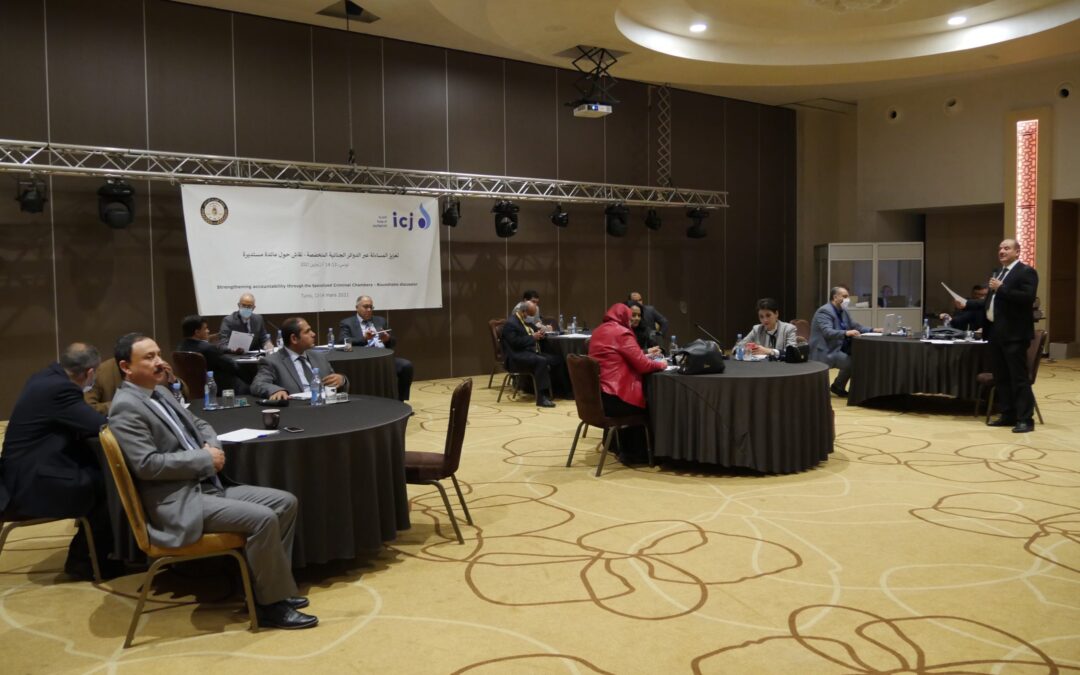
Mar 19, 2021 | Advocacy, News
On 13 and 14 March 2021, the ICJ and the Association of Tunisian Magistrates (AMT) organized a roundtable discussion in Tunis to assist Specialized Criminal Chambers (SCC) judges and prosecutors to advance accountability and justice in line with international law and standards.
Participants discussed in-depth the ongoing challenges to the fair and effective prosecution and adjudication of gross human rights violations before the SCC. They also examined joint approaches to address these challenges with a view to enhancing the fairness and effectiveness of the SCC proceedings and achieving accountability in turn.
At the roundtable, Said Benarbia, ICJ’s MENA ProgrammeDirector, underlined that SCC trials should enable victims to obtain redress and reparation, while ensuring the defendants’ right to a fair trial in compliance with Tunisia’s obligations under international law. Anas Hmedi, the President of the AMT, highlighted the key role that the SCC play in relation to the discovery of the truth, accountability and guarantees of non-recurrence of gross human rights violations in Tunisia.
Martine Comte, ICJ France Commissioner,stressed the importance of finding joint approaches and reinforcing coordination among the SCC to address the various challenges that that they are currently facing. Kalthoum Kennou, ICJ Tunisia Commissioner, called for the development ofjoint approaches to ensure victims’ participation at SCC trials and enhance support for the transitional justice process.
In light of the roundtable discussion, participants identified joint solutions and agreed to develop a set of recommendations targeting the High Judicial Council and its role in supporting the SCC and resolving the practical obstacles that might impede their work.
The roundtable is part of the ICJ’s efforts to enhance the SCC’s capacity to adjudicate the cases referred to them by the Truth and Dignity Commission (IVD) in a manner consistent with international law and standards.
Contact
Valentina Cadelo, Legal Adviser, ICJ Middle East and North Africa Programme, e: valentina.cadelo(a)icj.org
Asser Khattab, Research and Communications’ Officer, ICJ Middle East and North Africa Programme, e: asser.khattab(a)icj.org
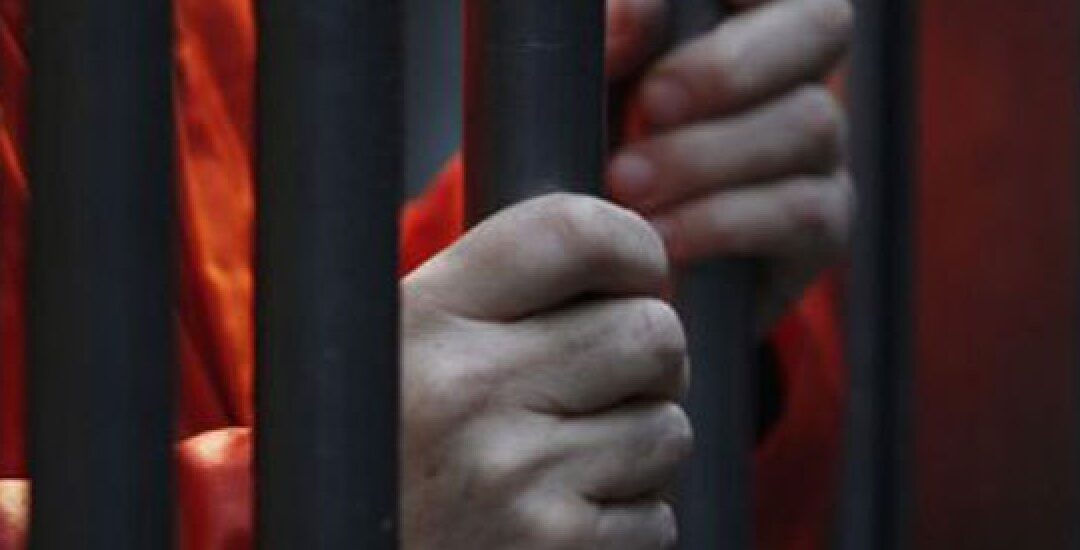
Mar 18, 2021 | News
The ICJ today condemned Sri Lanka’s new ‘de-radicalization’ regulations, which allow for the arbitrary administrative detention of people for up to two years without trial. The regulations could disproportionately target minority religious and ethnic communities.
Sri Lankan President Gotabaya Rajapaksa promulgated Prevention of Terrorism (De-radicalization from holding violent extremist religious ideology) Regulations No. 01 of 2021, which was publicized by way of gazette notification on 12 March, 2021. The “regulations”, which were dictated by the executive without the engagement of Parliament, would send individuals suspected of using words or signs to cause acts of “religious, racial or communal violence, disharmony or feelings of ill will” between communities to be “rehabilitated” at “reintegration centres” for up to two years without trial.
“These regulations, which have been dictated by executive fiat, allow for effective imprisonment of people without trial and so are in blatant violation of Sri Lanka’s international legal obligations and Sri Lanka’s own constitutional guarantees under Article 13 of the Sri Lankan Constitution.”
– Ian Seiderman, ICJ’s Legal and Policy Director
Article 9 of the International Covenant on Civil and Political Rights (ICCPR), to which Sri Lanka is a party, provides for a number of procedural guarantees for any person deprived of their liberty, many of which are absent in the Regulation. Administrative detention of the kind contemplated under the Regulations, is not permitted, as affirmed repeatedly by the UN Human Rights Committee.
Even prior to the promulgation of the new regulations under Sri Lanka’s Prevention of Terrorism Act No. 48 of 1979 (PTA), Sri Lankan authorities had already been invoking the PTA and the International Covenant on Civil and Political Rights Act, No. 56 of 2007 (enacted to incorporate certain provisions of the ICCPR into domestic law) effectively to persecute people from minority communities. Yet little or no action has been taken by the authorities against those inciting hatred or violence against minorities.
“The new regulations are likely to be used as a bargaining tool where the option is given to a detainee to choose between a year or two spent in “rehabilitation” or detention and trial for an indeterminate period of time, instead of a fair trial on legitimate charges.”
– Ian Seiderman, ICJ’s Legal and Policy Director
Contact
Osama Motiwala, Communications Officer – osama.motiwala@icj.org
Background
Section 3(1) of the ICCPR Act which prohibits advocacy of hatred that constitutes incitement to discrimination, violence or hostility has hitherto been misused to target members of minority communities. In April 2020, Ramzy Razeek, a retired government employee, was arrested for a Facebook post calling for an ideological ‘jihad’ against the policy of mandatory cremation of people who had died as a result of Covid-19. He was detained under the ICCPR Act for more than five months and finally released on bail due to medical reasons in September 2020.
In May 2020, Ahnaf Jazeem, a young Muslim poet, was arrested under the PTA in connection with a collection of poems he had published in the Tamil language, which were apparently misinterpreted by Sinhalese authorities to be read as containing extreme messages. Just last week, a few days after the promulgation of the new regulations, Ahnaf’s lawyers expressed alarm that both Ahnaf and his father were being pressured to make admissions that he had engaged in teaching ‘extremism’. The ICJ had previously raised concerns about the arbitrary arrest and prolonged detention of Human Rights lawyer Hejaaz Hizbullah. After being detained under the PTA for 10 months without being given reason for his arrest, he is now being tried for speech-related offences under the PTA and ICCPR Act.
The ICJ has consistently called for the repeal of the Prevention of Terrorism Act, which has been used to arbitrarily detain suspects for months and often years without charge or trial, facilitating torture and other abuse. The ICJ reiterates its call for the repeal and replacement of this vague and overbroad anti-terror law and regulations brought under it, in line with Sri Lanka’s international obligations.
The new PTA regulations require those who surrender or are arrested on suspicion of using words or signs to cause acts of violence, disharmony or ill will between communities to be handed over to the nearest Police Station within 24 hours after which a report is to be submitted by the Police to the Defence Minister (the position is currently held by President Gotabaya Rajapaksa) to consider whether the suspect should be detained further. The regulations would also apply to those who had surrendered or been taken into custody under the PTA, the Prevention of Terrorism (Proscription of Extremist Organizations) Regulations No. 1 of 2019 and the Emergency (Miscellaneous Provisions and Powers) Regulation, No. 1 of 2019.
The Attorney General is given the power to decide if a suspect should be tried for a specific offence or be send to a rehabilitation centre as an alternative. If the decision is to rehabilitate, the suspect would be produced before a Magistrate with the written consent of the Attorney General. The Magistrate may thereafter order that the suspect be referred to a rehabilitation centre for a period not exceeding one year. Such period can be extended by a period of six months at a time up to one more year by the Minister upon the recommendation of the Commissioner-General for Rehabilitation. The regulations further state that the Commissioner–General should provide the detainee with psycho-social assistance and vocational and other training during the rehabilitation period to ensure reintegration into society. The regulations also provide that such detainee may with the permission of the officer in charge of the Centre be entitled to meet their parents, relations or guardian once every two weeks.
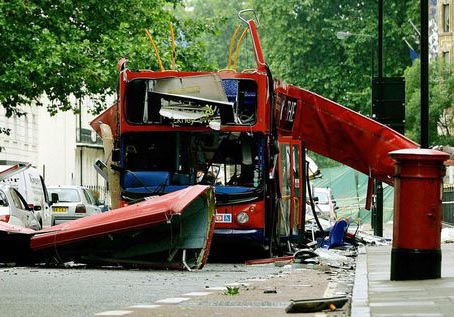
Mar 18, 2021 | Advocacy, Non-legal submissions
Today, the ICJ and ARTICLE 19 called on the UN Human Rights Council and its Advisory Committee to adopt a human rights-centred approach in their work on “negative effects of terrorism”, during a general debate on human rights bodies.
The joint statement reads as follows:
“Madam President,
The ICJ and ARTICLE 19 have followed the Advisory Committee’s ongoing work on the negative effects of terrorism on human rights and understand that it still finalizing its report on the topic.
We consider that the efforts of the Committee and this Council on this topic should focus exclusively on preventing and addressing human rights violations resulting from counterterrorism measures and promoting and protecting the human rights of victims of terrorism.
The Committee’s earlier report instead dedicated much space to the macro-economic effects of terrorism which do not lead to concrete recommendations to States on the human rights dimensions.
This focus proposed by some States diverts the longstanding focus of the Human Rights Council away from core human rights concerns and from States’ duties to prevent, protect, investigate, and redress human rights abuses.
The ICJ and ARTICLE 19 point out that the existing and longstanding normative and institutional framework on counterterrorism and human rights is already sufficient to address relevant impacts of terrorism from a human rights perspective.
We call on the Committee and the Council to bear this in mind as they continue their engagement on this important topic.
Thank you.”
Contact:
Massimo Frigo, ICJ UN Representative, e: massimo.frigo(a)icj.org, t: +41797499949
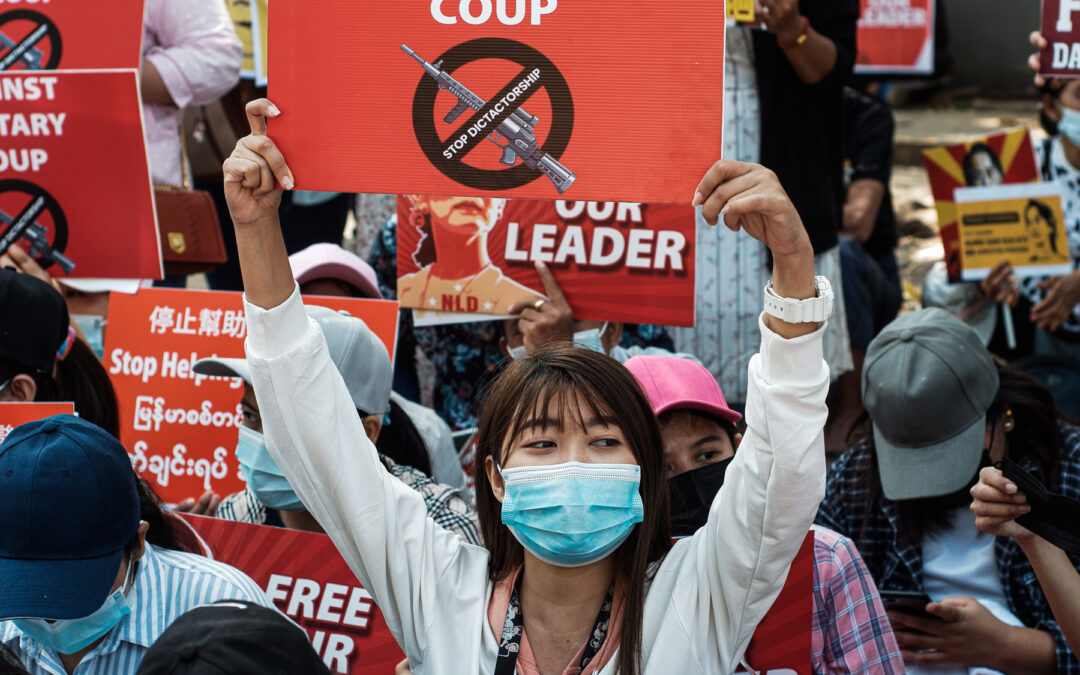
Mar 17, 2021 | News
Imposition of Martial Law in several areas of Myanmar subjects civilians to trial by military tribunals, a dangerous escalation of the military’s repression of peaceful protests, said the ICJ today.
“Use of martial law marks the return to the dark days of completely arbitrary military rule in Myanmar. It effectively removes all protections for protestors, leaving them at the mercy of unfair military tribunals.”
– Ian Seiderman, ICJ’s director of law and policy
On 14 March, the Myanmar military issued Martial Law Order 3/2021, covering a number of townships of different provinces in Myanmar. According to this order, military officials assume full authority from civilian officials, and civilians may be subjected to military tribunals for charges of 23 violations of the criminal code and other laws. The 23 crimes include many of the charges used most against peaceful protesters in the past month, including charges of ‘disrupting or hindering government employees and services’ and ‘spreading false news’ about the government, and ‘exciting disaffection towards the government.’
The Martial Law Order also assigns disproportionately severe sentences, including the death penalty and prison sentences with hard labor. Judgments of military tribunals are not subject to appeal, even if the death penalty is imposed.
“Martial law has been imposed in precisely the areas where the military have used unlawful and lethal force against peaceful protesters, and removes even the pretense of access to courts for the people whose rights have been violated systematically by the military, ” said Seiderman.
The ICJ’s detailed review of military courts has documented that they lack competence, independence and impartiality to prosecute civilians. International law provides that the jurisdiction of military tribunals must generally be restricted solely to specifically military offenses committed by military personnel.
“The military courts lack transparency, due process and judicial oversights. It leaves no possibility to appeal the sentences, including the death sentences that have been handed down by military generals, ” said Seiderman.
Since the military coup d’etat of February 1 and the declaration of a state of emergency, the military has enacted and amended legislation enabling ongoing gross human rights violations, including possible crimes against humanity. More than 200 people have been unlawfully killed, with 2,000 more injured as security forces have used excessive force to suppress peaceful protests.
Background
On 14 March, the military-appointed State Administration Council, in accordance with Article 419 of the Constitution, enacted Martial Law Order 1/2021, imposing martial law in a number of areas in Yangon. The affected areas were further expanded through two other orders issued on 15 March, Martial Law Order 2/2021 and 3/2021. These orders transfer all power to the Military Commander in those areas. All local administration bodies have been placed under martial law, effectively giving military full control of all judicial and administrative processes.
The Order 3/2021 in particular is divided into six main sections with the most concerning provisions in relation to the list of crimes to be heard by military tribunals, and the proscribed punishments.
Contact
Osama Motiwala, ICJ Asia-Pacific Communications Officer, e: osama.motiwala(a)icj.org
Mandira Sharma: ICJ Senior Legal Adviser, e: mandira.sharma(a)icj.org
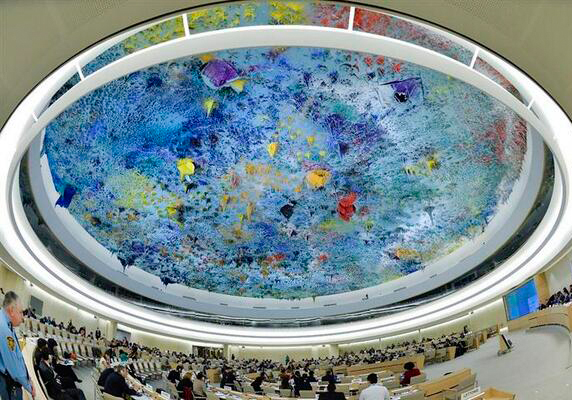
Mar 17, 2021 | Advocacy, Non-legal submissions
Today, the ICJ joined Amnesty International and other 14 NGOs to express concern at continued attacks on the Special Procedures of the UN Human Rights Council by some States and at efforts to undermine their independence.
The joint statement reads as follows:
“Madame President,
Amnesty International delivers this statement on behalf of 15 NGOs.
We are deeply concerned by continued attacks on the Special Procedures and efforts to undermine their independence. We urge all states to affirm their commitment to human rights and the effectiveness of the international human rights system, by rejecting and condemning these efforts.
We welcome the continued efforts of the Coordination Committee to address objective non-compliance of mandate holders under the Internal Advisory Procedure, including in response to the failure of the Special Rapporteur on the right to privacy to submit his reports to the Council in time for their consideration at this session. We urge all states to support the Coordination Committee in their efforts to respond to concerns related to the working methods of the Special Procedures, as well as complaints against individual mandate holders.
At the same time, we deplore the efforts of some states to use this process as a cover to undermine the independence and effectiveness of the Special Procedures for political reasons. As on numerous previous occasions, certain states repeatedly accuse the Special Procedures of politicization but fail to substantively address the human rights concerns they raise.
We particularly regret the Russian Federation’s efforts, on 5 March, to suspend the HRC session altogether and their continued attempts, together with other states, to introduce unwarranted state oversight on the Special Procedures.
We were also alarmed to witness personal attacks on the Special Procedures, most worryingly against the Special Rapporteur on freedom of religion or belief, by the Chinese delegation, who during the interactive dialogue accused the mandate holder of ‘spread[ing] false information’ and ‘lack[ing] minimum professional ethics.” Such ad hominem attacks are unacceptable, and the Council must respond in the strongest terms to condemn such incidents. They also reveal a broader rejection of dialogue on human rights challenges – despite repeated statements urging the Council to privilege ‘dialogue and cooperation’ – and a lack of willingness on the part of the state concerned to take action to protect human rights.
It is time for states at this Council to take a strong proactive stand for its independent mechanisms, ensuring that they have the support and resources needed to fulfil their mandates and to hold states accountable when they commit human rights violations.
Thank you.”
The signatories of the statement are:
- Amnesty International
- ARTICLE 19
- Asian Forum for Human Rights and Development (FORUM-ASIA)
- Center for Reproductive Rights
- CIVICUS: World Alliance for Citizen Participation
- DefendDefenders (East and Horn of Africa Human Rights Defenders Project)
- Forum Menschenrechte e.V.
- Human Rights House Foundation
- Human Rights Watch
- International Commission of Jurists
- International Federation for Human Rights (FIDH)
- International Movement Against All Forms of Discrimination and Racism (IMADR)
- International Service for Human Rights (ISHR)
- Privacy International
- Women’s International League for Peace and Freedom
Contact:
Massimo Frigo, ICJ UN Representative, e: massimo.frigo(a)icj.org, t: +41797499949









